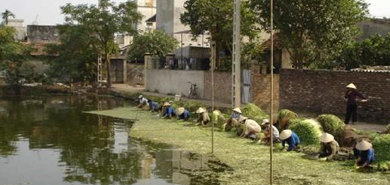| |
About
PAPUSSA
(For Thai, Khmer and Vietnamese click here)
PAPUSSA is a collaborative research project
between European and Asian partners funded by the European Union seeking
to better understand the importance and nature of aquatic food production
that occurs in and around some of the major cities of Southeast Asia.
The project, which started in January 2003, will continue for three years
and is working with partners in Hanoi and Ho Chi Minh City in Vietnam,
Phnom Penh in Cambodia and Bangkok, Thailand.
Narrow, disciplinary studies, whilst informative in terms of technical
issues, have failed to address the complex issues that will determine
the future of such peri-urban aquatic food production systems (PAFPS).
The project has an interdisciplinary approach in which the production
and livelihood impacts of PAFPS will be evaluated, consequences for health
and hygiene assessed and their importance within the larger framework
of urban and institutional development investigated. Working closely with
selected stakeholders pilot studies to improve these systems will then
be initiated and assessed.
What are peri-urban aquatic food production systems and why are they important?
Aquatic food products are important in
the diets of people of the region and include a variety of vegetables,
fish and other animals. The origins of farming aquatic animals in the
Region are quite likely to be urban since until recently most rural areas
of Asia where people value fish as food had access to abundant natural
stocks.
Urbanisation in SE Asia is occurring most
rapidly in larger cities typically situated on the floodplains of large
rivers. Limited drainage infrastructure and formal sanitation serving
such cities, together with the extraction of fill from surrounding areas
for construction and flood defences has frequently resulted in peri-urban
wetlands that become both de facto waste treatment and food production
systems. Such peri-urban wetlands have been important food production
centres and appear to have enduring importance to the livelihoods of poor
people. By the same token these peri-urban lagoons, canals and ponds commonly
provide the only accessible means of disposing of human excreta and therefore
have much broader importance to urban communities. Although attention
has been drawn to the benefits of such wetlands, generally their value
is unmeasured and impacts of contamination from wastes, changing access
and urbanisation unknown.
Informed policy and
management of peri-urban zones in Asia is handicapped by a lack of informed
and balanced debate regarding how stakeholders value aquatic production
systems in terms of public health risks, food availability and livelihoods.
The lack of information about these systems contrasts with an extensive
knowledge base on solid waste and wastewater reuse in agriculture.
The dynamic nature of peri-urban areas require scientists, planners and
policy makers to deal with rapid and often destructive changes to PAFPS
whilst attempting to meet the challenge of meeting basic needs.

Women washing the popular cultivated edible aquatic plant
morning glory after harvest in Bang B village Ha Noi, Vietnam June 2004
PAPUSSA
will
- consider the risks and
constraints to the sustainability of PAFPS outlined above and their
dual roles in food production and managed recycling of wastewater
- develop an improved
understanding of the role of PAFPS in employment generation, asset creation,
pollution reduction, food provision and waste reuse
- assess impacts of the systems on producers, consumers
and institutions involved
- involve stakeholders in the development and use of
the knowledge generated
- contribute to a better
understanding of the value of PAFPS to poor communities and permit balanced
and rational urban planning and development
- pilot enhanced management strategies that will safeguard
the benefits associated with PAFPS to stakeholders.
back
to top
|